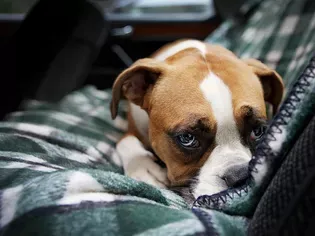Diarrhea in Puppies
Updated on 05/26/24

Diarrhea in Puppies: A Comprehensive Guide to Causes, Prevention, and Treatment
Diarrhea is a common ailment in puppies, and it can be a source of concern for pet owners. While some cases of diarrhea are mild and will resolve on their own, others can be more serious and require veterinary attention. In this comprehensive guide, we will explore the causes of diarrhea in puppies, how to prevent it, and the various treatment options available.
Causes of Diarrhea in Puppies
The most common causes of diarrhea in puppies include:
* Infectious Agents: Bacteria, viruses, and parasites can all cause diarrhea in puppies. Some of the most common infectious agents include parvovirus, coronavirus, and Giardia.
* Dietary Indiscretion: Eating something that doesn't agree with them, such as garbage or table scraps, can cause diarrhea in puppies.
* Stress: Stressful events, such as moving to a new home or being separated from their mother, can also trigger diarrhea in puppies.
* Medications: Certain medications, such as antibiotics, can cause diarrhea as a side effect.
* Underlying Medical Conditions: Underlying medical conditions, such as inflammatory bowel disease or pancreatitis, can also lead to diarrhea in puppies.
Preventing Diarrhea in Puppies
The best way to prevent diarrhea in puppies is to take steps to reduce their exposure to the risk factors mentioned above. Here are some tips for preventing diarrhea in puppies:
* Vaccinate your puppy: Vaccinations can help protect your puppy from infectious agents that can cause diarrhea.
* Feed your puppy a high-quality diet: A healthy diet will help to keep your puppy's digestive system functioning properly.
* Avoid giving your puppy table scraps: Table scraps can contain harmful bacteria that can cause diarrhea.
* Minimize stress in your puppy's life: Provide your puppy with a safe and comfortable home environment.
* Be careful when administering medications to your puppy: Always follow the veterinarian's instructions carefully when administering medications to your puppy.
Treatment for Diarrhea in Puppies
The treatment for diarrhea in puppies will vary depending on the underlying cause. If your puppy is experiencing diarrhea, it is important to take them to the veterinarian for an evaluation. The veterinarian will perform a physical examination and may recommend diagnostic tests, such as a fecal exam or blood tests, to determine the cause of the diarrhea.
Treatment for diarrhea in puppies may include:
* Antibiotics: If the diarrhea is caused by a bacterial infection, the veterinarian may prescribe antibiotics.
* Antiparasitic medication: If the diarrhea is caused by a parasitic infection, the veterinarian may prescribe antiparasitic medication.
* Dietary changes: The veterinarian may recommend changing your puppy's diet to a bland diet, such as cooked chicken and rice.
* Intravenous fluids: If your puppy is dehydrated, the veterinarian may administer intravenous fluids.
* Hospitalization: In severe cases, your puppy may need to be hospitalized for treatment.
Home Care for Puppies with Diarrhea
In addition to veterinary treatment, there are some things you can do at home to help your puppy with diarrhea. Here are some home care tips for puppies with diarrhea:
* Keep your puppy hydrated: Offer your puppy plenty of water or Pedialyte to drink.
* Feed your puppy a bland diet: Feed your puppy a bland diet, such as cooked chicken and rice.
* Avoid giving your puppy table scraps: Table scraps can contain harmful bacteria that can worsen diarrhea.
* Keep your puppy's environment clean: Clean up any messes that your puppy makes to prevent the spread of bacteria.
* Monitor your puppy's symptoms: Pay attention to your puppy's symptoms and contact the veterinarian if they worsen or if your puppy becomes lethargic or stops eating.
When to Contact the Veterinarian
It is important to contact the veterinarian if your puppy is experiencing diarrhea, especially if the diarrhea is severe or persistent. The veterinarian can determine the underlying cause of the diarrhea and recommend the best course of treatment.
Conclusion
Diarrhea is a common ailment in puppies, but it can be a serious condition if left untreated. By understanding the causes of diarrhea, taking steps to prevent it, and seeking veterinary care when necessary, you can help your puppy stay healthy and happy.
Explore More Pets

Basic Training
Puppy and Baby Introductions

Working Dog Breeds
All About Search and Rescue Dogs

Dog Treatments
Puppy Vaginitis: Signs, Causes and Treatment

Dog Adoption
After More Than 1,200 Days in the Shelter, Coco Goes Home

Basic Training
How to Train Your Puppy to Go on Potty Pads

Hybrid Dog Breeds
The Difference Between a Mutt, Mixed Breed, or Designer Dog?

Dog Treatments
Nail Problems in Dogs

Puppies
7 Reasons Why Two Dogs Are Better Than One
